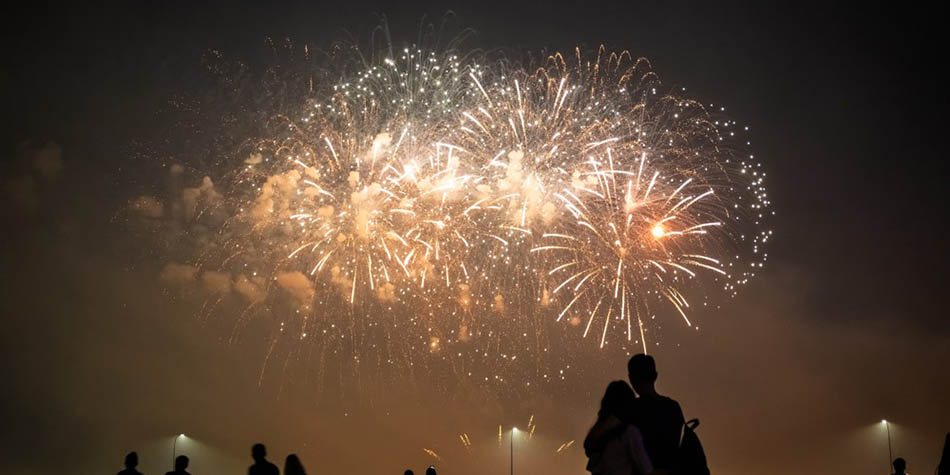
Maintaining proper fireworks safety can allow you to enjoy fireworks and stay in good health.
Summer is in full swing, and with the Fourth of July coming up, you may be planning to celebrate with fireworks. Although fireworks can be beautiful to watch, they can have short- and long-term health effects, in addition to potentially causing injury. Before you light that fuse, learn more about how to practice fireworks safety.
How do fireworks work?
To understand why fireworks can pose a health risk, it's important to know how they work. The main ingredient in fireworks is black powder. Also known as gunpowder, black powder explodes when ignited. Fireworks are made up of stars containing chemicals or metals that create different colors. For example, a star that contains copper will produce a blue firework. Other minerals used to make different colored fireworks include barium, strontium and sodium. Minerals can be mixed together to produce different colors.
The stars are put into a cardboard or plastic container called a shell. The arrangement of the stars determines the firework's shape. Fuses are attached to or embedded within the shell, which is then wrapped in paper. When the fuse is lit and reaches the stars in the shell, the stars explode in the designed shape.
What happens when a firework explodes?
Color isn't the only thing fireworks produce when they explode. They also emit smoke, which may be difficult to see in the dark and can linger after the colors disappear. The smoke contains particles that people can inhale directly into their lungs, causing negative health effects. The chemicals and pollutants in fireworks can also seep into water and soil. This can affect aquatic and plant life, moving up the food chain to humans.
Fireworks also produce sound. According to Healthy Hearing, the sound is caused by a chemical reaction after the fuse is lit. As it burns, the gunpowder releases hot gas that quickly expands. When the hot gas runs out of room to expand within the firework, it explodes and causes a blast wave.
Any sound above 85 decibels can lead to hearing loss, depending on the length and frequency of exposure. However, the sound output for fireworks can reach 150 to 175 decibels — louder than a jet engine taking off. The World Health Organization indicates that the maximum safe level for adults is 140 decibels. For children, 120 decibels is the maximum safe level. Babies shouldn't be exposed to fireworks at all.
How to practice fireworks safety
If you plan to enjoy fireworks this summer, keep these safety tips in mind to protect yourself and your loved ones.
Maintain a safe distance
Keeping a safe distance from a fireworks display can help protect your hearing. To prevent injury, the Department of Homeland Security recommends a safety perimeter of at least 35 feet for ground-based fireworks and a perimeter of at least 150 feet for aerial fireworks. However, Healthy Hearing suggests keeping a distance of 500 feet. At that distance, you can still have a good view without risking damage to the inner ear's hair cells. The farther away from the sound you are, the less harmful it will be to your ears.
Use ear protection
If you plan to watch fireworks up close, earmuffs or earplugs can help protect your hearing. You can buy foam earplugs at most drug stores or pharmacies. Young children should wear earmuffs since earplugs might be too big and can be a choking hazard.
Keep water nearby
Fireworks can cause serious burns when ignited if you don't follow safety precautions. If you're going to use fireworks at home, back away quickly after lighting them. If the firework doesn't fully ignite or burn, don't try to relight it. Instead, douse it with a bucket of water or hose. Also, before discarding fireworks that have burned completely, pour water over them to prevent trash fires.
Wear a mask
If you have a respiratory condition like asthma or chronic obstructive pulmonary disease (COPD), the pollutants in firework smoke can worsen your condition. If possible, try to stay upwind of the fireworks, or consider wearing an N95 mask. This type of mask is an air-purifying respirator that filters 95% of smoke particles. It creates a tight seal that some users might not be used to, so it could be helpful to practice putting one on before attending a fireworks display.
Avoid illegal fireworks
If you plan to set off your own fireworks, make sure they're legal. The U.S. Consumer Product Safety Commission (CPSC) performs vigorous checks to ensure legal fireworks are safe before they reach stores. Illegal fireworks don't meet the CPSC's regulations and can cause serious injury. They may also contain more powder than recommended to create bigger explosions. Legal fireworks have proper labeling, while illegal fireworks are unmarked.
Although it's best to leave fireworks displays to the professionals, it's possible to enjoy them safely on your own. Check your state's laws first, and light fireworks in an open, clear area only. Avoid flammable material and dry leaves or grass, and treat all fireworks as if they're active, to prevent injury.
Whether you're lighting your own fireworks or enjoying a professional fireworks display, following these tips can help you stay safe and healthy.